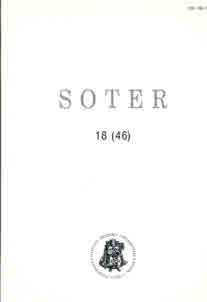Bažnyčios misijos ir politinių uždavinių santykio problematika
Problematical character of relationship between mission and political undertakings of the church
Author(s): Aušra EidukaitytėSubject(s): Christian Theology and Religion
Published by: Vytauto Didžiojo Universitetas
Keywords: politika; Bažnyčios mokymas; misija; politinė teologija; mesianizmas; visuomenė; pastoracija; politics; Church’s teaching; mission; political theology; messianism; society; pastoral;
Summary/Abstract: The mission of the Church emanates from Christ’s solemn mandate to proclaim the Gospel to all men, incorporating them through Baptism into the people of God. In the Church there is a diversity of ministry but an oneness of the mission. The Church as the people of God takes an action in the world, for this reason pastoral work puts God’s salvation into practical effect in time and history. Since the Catholic Church is universal and existing in the world, it coexists in various social and political systems. In this way, the faithful have inevitable contacts with the political world. The commitment of Christians in the world has found a variety of expressions in the course of the past 2000 years. One such expression has been Christian involvement in political life. Politics is a communal behavior and the value necessary to give birth to reasonable solutions unifying society. In modern world, political philosophy elucidates the human life spheres in a different way than religion does. Frequently, the social political attitude and the outlook of the faithful do not coincide with the teachings of the Magisterium, or the laity erroneously considers this behavior as morally correct which is declared as contrary to the law of God by their Pastors. Thus, up-to-date situations of political, economic and cultural life of the society require efficient and broad apostolic service obligating all the members of the Church to serve Christ and the Church with greater sincerity and responsibility. In Lithuania after the reestablishment of Independence, when striving to implement democracy, erroneous messianism approaches have been noticed. During the democratic elections the faithful are also the citizens of their state, they vote for Populist Parties and political leaders who promise the fast and evident life improvement, while non-believers often cite Gospel phrases and religious extracts striving to justify irrationality of their political deeds and ideas. Erroneous messianisms which emerge in various nations and cultures deteriorate both theology and politics. Today political philosophy does not depend on religion. However, the teaching of the Church possesses clear opinions towards political participation. This paper intends to reveal the problematical character of relationship between the mission and political undertakings of the Church. Applying a research method scientific philosophical, social, theological literature and the Church’s documents has been analyzed. Three chapters are devoted to this discussion: 1) analysis of aspects political theology and their criticism provided by the teaching of the Church; 2) significance of the Authority of the Church in political life; 3) pastoral activities of the Church and their undertakings in politics. The political theology referring to renewed eschatology treats Christianity as a reconstruction of the world and strives to establish the kingdom of God there by political means and universal liberation.
Journal: SOTER: religijos mokslo žurnalas
- Issue Year: 47/2006
- Issue No: 19
- Page Range: 69-86
- Page Count: 18
- Language: Lithuanian

